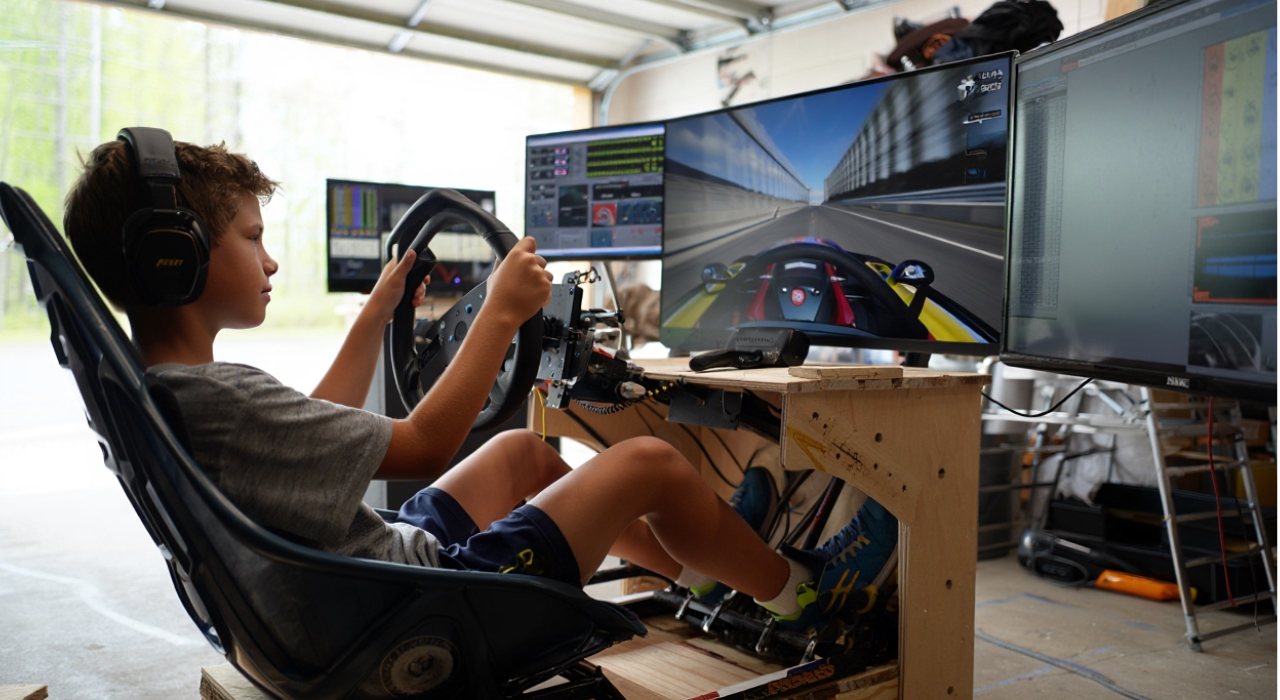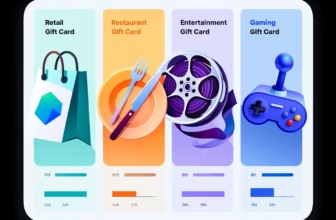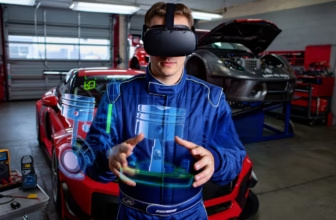
The world of sim racing is booming, attracting enthusiasts of all ages—especially ambitious teens eager to join the action. Recently, the global community was moved by a 13-year-old’s post on Reddit, in which he revealed his first humble racing rig.
His openness sparked a flood of encouragement, practical advice, and heartfelt mentorship from more experienced racers. This story not only highlights how teens engage with esports setups but also showcases the unique support culture that defines sim racing today.
A young sim racer’s post goes viral
First sim as a 13 yr old from r/simracing
When the teen, new to the scene but full of passion, shared a photo of his beginner-friendly setup (a Logitech G923 wheel and a sturdy desk chair), Reddit’s r/simracing community quickly rallied behind him:
- Many seasoned racers offered a warm welcome, sharing tips they wished they’d known at his age.
- Anecdotes about starting out with simple gear reminded everyone how universal the “beginner’s journey” is.
- Humorous banter and nostalgia bridged generational gaps, making it clear the sim racing world embraces newcomers.
Why the sim racing community stands out
Unlike some online spaces, the sim racing community is often cited for its friendliness and helpfulness. Racers of all levels—casual and professional—are known for:
- Encouraging new participants.
- Offering gear and setup advice.
- Sharing racecraft tips in a supportive, non-toxic way.
- Mentoring through Discord groups, leagues, and forums.
This positive atmosphere is intentionally maintained through active moderation and a shared ethos of sportsmanship, making it an especially welcoming environment for young racers starting their journey.
What experts and studies say about sim racing for teens
Research and expert analysis underscore several key benefits for adolescents involved in sim racing:
- Cognitive and reflex development: Teens engaging in sim racing see enhanced concentration, faster reaction times, and stronger problem-solving skills compared to average gamers.
- Confidence and self-esteem: Mastering car control, racecraft, and strategy builds confidence that spills over into school and social life.
- STEM education: Sim racing provides hands-on exposure to physics, engineering, and even coding—supporting interest in science and technology careers.
- Healthy competition: These platforms offer safe, structured venues for youth competition and teamwork, fostering resilience and persistence.
Professional drivers and training programs recognize sim racing as valid preparation, crediting it for sharpening skills and fueling a new wave of motorsport enthusiasm among the young.
How the community supports and educates newcomers
The outpouring of advice to the 13-year-old Reddit poster is typical of how sim racing culture nurtures growth:
- Suggestions for affordable upgrades: Experienced racers often recommend step-by-step hardware evolutions, such as adding load cell pedals or switching to more stable seats when possible.
- Racing etiquette and sportsmanship: Community members emphasize the importance of fair play, patience under pressure, and learning from mistakes—qualities essential for both sim and real racing.
- Game recommendations: Veterans suggest trying true simulators like Assetto Corsa Competizione and iRacing for deeper realism, while also warning about stricter driving standards online.
These exchanges set young drivers up for success, whether they aim to have fun or pursue competitive racing ambitions.
The sim racing market and youth growth
Sim racing is not just a hobby—it’s an expanding industry with strong youth involvement:
- The global sim racing market is valued at more than $1.3 billion in 2025, with projected robust annual growth as entry-level equipment becomes more affordable and esports gain legitimacy.
- Accessible hardware like entry-level wheels and pedals has removed many financial barriers for teens and families, democratizing access to sim racing.
- Schools and clubs increasingly use sim racing for after-school programs and STEM activities, recognizing its educational and social value.
The broader impact: Families, friends, and lifelong learning
Sim racing’s accessibility and flexibility allow:
- Families to race together regardless of age or skill, further strengthening bonds.
- Cross-generational mentoring, where older racers share wisdom and inspire younger drivers.
- Endless opportunities to learn—whether tinkering with hardware, experimenting with setups, or tackling new tracks and cars.
Research consistently finds that such inclusive, dynamic environments foster lifelong interests in technology, teamwork, and personal growth.
Pro tips from the pros—and from Reddit
Some top advice highlighted by both professionals and friendly community members includes:
- Focus on fundamentals first: Develop braking, throttle control, and race awareness before chasing new equipment.
- Practice, but have fun: Enjoy improvement and experimentation; the best racers blend discipline with joy.
- Engage with the community: Join league races, watch tutorial streams, and don’t hesitate to ask for help.
- Keep perspective: Sim racing is a journey—everyone starts somewhere, and every champion was once a beginner.
Conclusion: New talent, bright future
This story of a 13-year-old’s first setup reminds us that the spirit of sim racing thrives on curiosity, encouragement, and shared passion. By rallying around young drivers, the community not only supports dreams but also ensures the future of virtual motorsports will be more creative, competitive, and inclusive than ever.





